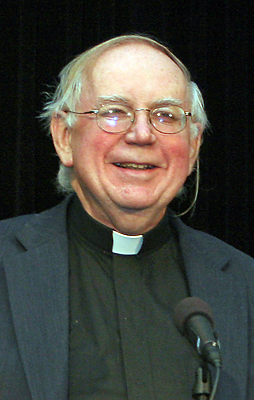
 COLUMBIA—The most effective way for Catholic clergy and women religious to deal with disagreements over hot-button issues such as health care legislation and abortion can be summed up with one word — dialogue.
COLUMBIA—The most effective way for Catholic clergy and women religious to deal with disagreements over hot-button issues such as health care legislation and abortion can be summed up with one word — dialogue.
That was the consensus at a group discussion held at St. John Neumann Church on Oct. 8, led by Jesuit Father John Langan. Father Langan was one of the keynote speakers at the annual Bernardin Lecture Oct. 7 at the University of South Carolina.
Father Sandy McDonald, pastor of St. John Neumann Church in Columbia and vicar for ecumenical and interreligious affairs for the diocese, organized the discussion.
In attendance were Msgr. Joseph F. Hanley, pastor of Blessed Sacrament Church in Charleston; Father Peter Clarke, pastor of Our Lady of the Valley Church in Gloverville; Father Emmanuel Andinam, administrator pro tem of Corpus Christi Church in Lexington; and Sister Nancy Hendershot of the Sisters of Charity of St. Augustine.
Father Langan said Catholicism’s potential positive impact in the public square is hampered these days because of partisan internal conflicts.
“There’s a lot of negative stereotyping within the church, people drawing lines and not talking to other people because their opinion is different,” he said. “The church needs a longtime pastoral commitment … that has to involve a listening and willingness to take seriously the pains and sufferings of people on the other side.”
He said a useful example of this is the priest’s experience of hearing confession. While the priest does not condone or agree with the sins being confessed, he said, he does show a willingness to listen to the penitent, which often involves hearing difficult and painful stories.
Father Langan said a church torn by partisan bickering also loses its effectiveness during a time when its credibility and public image have already been diminished in some spheres because of the recent sexual abuse scandal.
He said the church’s pro-life message would be most effective if it were presented in a more positive light, highlighting the dignity of women, children and the family.
“On the abortion question, we have important things to say to the dominant culture,” he said. “Tying it to partisan politics is not a way to make the message viable.”
Father Langan, along with others at the forum, said they were concerned that Christian unity in some respects has fallen by the wayside as both Catholics and Protestants increasingly deal with their own internal conflicts. The current divisive political atmosphere makes ecumenical outreach all the more important.
Sister Nancy said it would be helpful to apply Cardinal Joseph Bernardin’s vision in the health care debate, which has become increasingly divisive since passage of the Patient Care Act in March.
Cardinal Bernardin’s “seamless garment” approach to pro-life issues promoted the sanctity of life at all levels and stages, and included battling poverty and other social problems that undermined human dignity.
Opposing sides, she said, are often not willing to make any effort to find common ground. She said one of the most effective ways to promote church teaching on life issues, particularly abortion, is to continue to develop programs to help women and children.
The group also talked about partisan bickering and heavy-handed attitudes about social issues that can sometimes alienate lay people who are looking for guidance.
Father Clarke said one problem might be that priests are not addressing issues related to the health care debate in their homilies. Constructive and instructive preaching is often the first step toward dialogue. He believes it is also important for parish priests to communicate with people and learn their perspectives on issues.
“A priest wants to be close to the judgments and experience of the people we serve,” he said.
Father Andinam said he believes conversation with opposing sides is important because it may be one of the only ways to convey positive church teaching about the dignity of the human person to those who aren’t familiar with it.
Father Langan said the simple act of listening to one another could help share the church’s message on important social issues.
“To be attentive and able to listen is part of what we are called to do,” he said.
